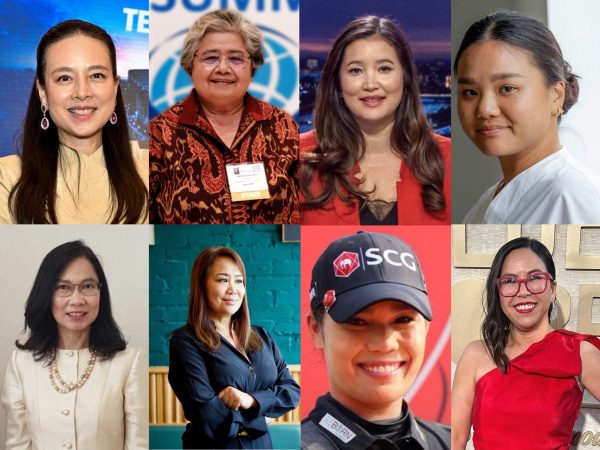Closing the gender gap in the workplace

To commemorate International Women’s Day today, a human rights activist, a top company executive and managers share insights into sustaining and growing gender diversity and inclusion
Gender in the workplace remains a hot issue in Thailand, not least because the number of senior managerial positions are growing at a snail’s pace. Female workers quickly hit the proverbial glass ceiling which limits opportunities for women to be promoted to higher position and contributes to the gender wage gap. Moreover, the presence of women in the country’s defense and security sectors is relatively low.
“Women are less likely to be hired for senior managerial positions and even less likely to be promoted to them, unless they work for their own company or one that is owned by the family,” says Angkhana Neelapaijit, a former human rights commissioner and chair of the sub-committee on gender equality and women’s rights.
“Women as individuals have the right to equal opportunities like men in all areas of life and have access to all human rights. Women and men have the basic human right to satisfaction with their work and to the opportunity to grow and develop their full potential at work,” she adds.
Thailand currently ranks 75th out of 153 countries in the World Economic Forum’s 2020 Global Gender Gap Report. By the end of 2020, the report estimated that women would make up roughly 35% of top management positions in firms and 16% of representatives in parliament.
Ms Angkhana explains that the role and the presence of women in the defense and security sectors of the country is of paramount importance but that these sectors are still male-dominated. But Thai society today needs women’s presence and activities in those areas.
“Thai women today are active in a variety of social areas. And women need to be present in the defense and security sectors of the country as well. This can only be possible when there are more women employed in such areas. Obviously, women can more easily communicate with women involved in the defense and security sectors of the country and express their problems. Put simply, women in the defense and security sectors can work for other women very easily. So, both women and men can benefit from their services,” Ms Angkhana said.
She is calling on the government, organisations and firms to step up efforts to promote the equal participation of all individuals in decision-making processes and to also consider them a necessary component.
Thailand’s Gender Equality Act continues to be largely ignored, having been disappointingly under-used since it was passed by the government six years ago this month.
Ms Angkhana is also calling upon all firms to respect, promote and protect human rights of female employees and support them to reach their full potential to ensure that everyone has access to the same opportunities and the same fair treatment.
She says this can be done by improving human development as well as initiating worker support initiatives, performance evaluation and remuneration, workplace facilities and corporate culture.
Creating equal opportunities for all
The calls have been heard by Henkel Thailand. The company comes under the umbrella of Germany-based chemical and consumer goods company Henkel AG & Co. KGaA, which is willing to invest in changing attitudes and behaviours regarding gender equality and corporate culture to enhance long-term growth and value creation.
Henkel Thailand has long been committed to creating equal opportunities for all in the workplace. Gender equality and diversity and inclusion are an integral part of the company’s culture.
“Henkel has a strong diversity and inclusion policy and we celebrate diversity and inclusion every year at our Henkel offices worldwide,” says Andrianto Jayapurna, president of Henkel Thailand.
He adds that the company recognises the value of women in the workplace and places great importance on empowering women, allowing them to grow their career paths.
According to him, 52 per cent of Henkel Thailand’s employees are female and about 60 per cent of the company’s executive committee is made up of females.
“In my opinion, the ability to wear many hats is one of women’s biggest strengths. They have the ability to balance careers and their household amongst many other responsibilities. This allows them to be natural multitaskers with great flexibility and agility. Because of their varied experiences in life, they also tend to be more empathetic and nurturing and make better decisions,” he says.
Mr Andrianto explains that the company has worked hard to get more women into all levels. For all job positions, the HR manager has to ensure that 50 per cent of resumes of female applicants are passed to the hiring managers for consideration. At the senior management level, the company uses blind hiring, a process of recruitment without identifiable personal information being made available so that no unconscious bias is created.

Warangkana Siriyodhipun is the head of Finance and Compliance Officer at Henkel Thailand and is a member of the company’s executive committee.
She says the company values women and motherhood. The company’s executive committee is working hard on improving the workplace to support the company’s employees.
“We noticed an increasing number of pregnant employees. So, we’ve made one of the rooms in our office into a lactation room, providing mothers with a safe and comfortable environment to pump in the office and giving them the confidence to return to work,” Ms Warangkana said.
According to her, the company’s employees are granted an extra 45 days of paid maternity leave on top of the legal requirements. They are also encouraged to have a healthy balance between work and personal responsibilities and take advantage of the environment created by the company that enables employees to feel connected as well as the flexible work hours.

Cindy Deekitwong, global head of marketing, incubator business in adhesive technologies at a Henkel unit in the United States says the company provides an inclusive environment that enables her to grow in her career path. She has worked in different functions throughout her 19 years with the company. A Thai, she has been promoted to work at the global level of Henkel.
“From my perspective, it’s the perfect time to be a female working in the manufacturing and industrial sectors. Today, more and more women are holding business responsibilities in the 3D printing field. Women have also made gains in nearly every other area, including human resources, finance, legal and administration. We’re learning from one another and helping each other grow and become stronger together. I’m proud of my country and committed to driving female diversity in our organisation,” she says.
Ms Warangkana empowers women at work to hold their heads high and have confidence in themselves, saying: “We should have passion to drive ourselves towards specific goals, no matter how unlikely or difficult situations might be.
“Gender is no longer the big obstacle for women it was in the past as many companies provide equal opportunities to all employees, regardless of gender. We should work to show our talent, strengths, and leadership to prove that we can have a work-life balance and be leaders.”






